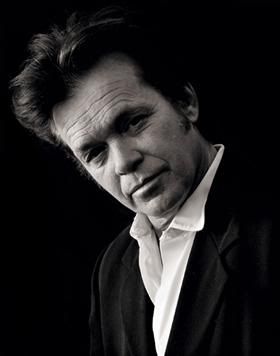 I'm always interested when a musician shares their thoughts in regard to what's going on in their business, especially now that the old paradigms are obviously dying (or evolving, depending on whether you're the half empty or half full type). Here's what John Mellencamp had to say about it on The Huffington Post. For those who aren't inclined to read the whole thing, the gist is that he blames most of the industry's current problems on executives in charge during the late '80s and early '90s who were not only excessively greedy...
I'm always interested when a musician shares their thoughts in regard to what's going on in their business, especially now that the old paradigms are obviously dying (or evolving, depending on whether you're the half empty or half full type). Here's what John Mellencamp had to say about it on The Huffington Post. For those who aren't inclined to read the whole thing, the gist is that he blames most of the industry's current problems on executives in charge during the late '80s and early '90s who were not only excessively greedy... "In essence, the artists were no longer the primary concern; only keeping their stockholders fat and happy and "making the quarterly numbers" mattered; the music was an afterthought."
...but also lacked the vision to anticipate and take advantage of developing technology...
"Not understanding the possibilities, they ignorantly turned it into a nightmarish situation. The nightmare is the fact that they simply didn't know how to make it work for us."
He's definitely not a fan of the skewed ratings generated by Broadcast Data Systems (BDS) and SoundScan...
"Record companies soon discovered that because of BDS, they only needed to concentrate on about 12 radio stations; there was no longer a business rationale for working secondary markets that were soon forgotten -- despite the fact that these were the very places where rock and roll was born and thrived. Why pay attention to Louisville -- worth a comparatively few potential listeners -- when the same one spin in New York, Los Angeles or Atlanta, etc., was worth so many more potential listeners?"
He also resents and rejects the notion that artists should be expected to be more actively involved in the promotion of their music...
"These days, some people suggest that it is up to the artist to create avenues to sell the music of his own creation. In today's environment, is it realistic to expect someone to be a songwriter, recording artist, record company and the P.T. Barnum, so to speak, of his own career? Of course not."
To sum up...
"Had the industry not been decimated by a lack of vision caused by corporate bean counters obsessed with the bottom line, musicians would have been able to stick with creating music rather than trying to market it as well."
While I respect the fact that he obviously has a more informed perspective on this than I do, I'm not sure I agree with everything he says here.
He seems to want a system that is dedicated to artistic expression while simultaneously distributing product into as many ears as possible and insulating the artist from having to participate in mundane, non-creative chores. I don't think such a mechanism has ever existed, or even could. Certainly not without the artist's slice of pie shrinking, which is something I'll bet he doesn't want. Someone with whom I was discussing this suggested that "...Mellencamp is saying that art and business have to find a balance and coexist for the industry to prosper. When artists dominate, you have excess. When business dominates, you have vapid corporate pop that nobody wants. That 'sweet spot' middle ground seems to be missing." I'd say that it would be great if they could find that middle ground. We'd all benefit from it. But I think it would require both sides to behave in ways that run contrary to their nature, with the execs letting the artists make the artistic decisions (content, presentation and timing/frequency of releases) and the artists getting out there and being more accessible, available and visible. I just don't see that happening.
Mellencamp talks about the failure to recognize and react to developing technology as one of the industry's major failings. Well, I believe the artists that are embracing the new technologies, especially social media such as Facebook, MySpace, YouTube and Twitter, stand to benefit. The public is rapidly becoming accustomed to having increased access to and interactivity with artists. The days of putting out an album and saying "Here, now leave me alone and I'll see you again in 12 months" are over for anybody who expects to still be around in 13 months. Mellencamp suggests that it's unrealistic to expect the artist to wear so many hats, but I question that assertion. Every professional musician I've ever talked to says that you make more real money by generating your own music and selling it out of the trunk of your car yourself (so to speak) than you do with any record deal (not to mention the control you get to maintain over the ownership of your material, the value of which is hard to calculate). Lots of people are starting to use technology to do just that. The point being, there's more than just one way for an artist to "make it" now, and it's hard to see that as anything but positive. I'm not sure that would be possible if the music industry weren't in the shape it's in.
Personally, I'm kind of excited by the prospect of the old system being torn down, only because of what could potentially be re-built.















No comments:
Post a Comment